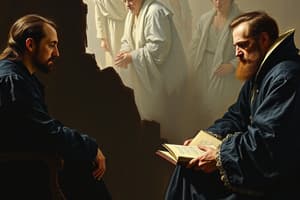Podcast
Questions and Answers
What does Lady Macbeth fear about Macbeth's ambition?
What does Lady Macbeth fear about Macbeth's ambition?
- He is easily swayed by the witches
- He lacks ambition
- He is too full of 'th’ milk of human kindness' (correct)
- He is too ruthless to become king
What does Lady Macbeth ask the spirits to do in her famous speech?
What does Lady Macbeth ask the spirits to do in her famous speech?
- Grant her the power to rule the kingdom
- Unsex her and fill her with cruelty (correct)
- Ensure Macbeth's success in battle
- Protect her from harm
What news does the messenger bring to Lady Macbeth?
What news does the messenger bring to Lady Macbeth?
- The witches are coming to meet Lady Macbeth
- Macbeth has been taken prisoner
- The king is approaching the castle (correct)
- Macbeth is plotting against the king
What is the content of the letter Lady Macbeth receives from Macbeth?
What is the content of the letter Lady Macbeth receives from Macbeth?
What does Lady Macbeth resolve to do after reading the letter from Macbeth?
What does Lady Macbeth resolve to do after reading the letter from Macbeth?
Flashcards are hidden until you start studying
Study Notes
Lady Macbeth's Thoughts and Actions
- Lady Macbeth fears that Macbeth's ambition is not strong enough to commit a murder.
- In her famous speech, Lady Macbeth asks the spirits to "unsex" her, take away her femininity, and fill her with cruelty to prepare her for the murder.
- The messenger brings news to Lady Macbeth that King Duncan is coming to visit Macbeth's castle.
- The content of the letter Lady Macbeth receives from Macbeth is about the witches' prophecies and his new title of Thane of Cawdor.
- Lady Macbeth resolves to do whatever it takes to make Macbeth king after reading the letter, including urging him to commit the murder.
Studying That Suits You
Use AI to generate personalized quizzes and flashcards to suit your learning preferences.



